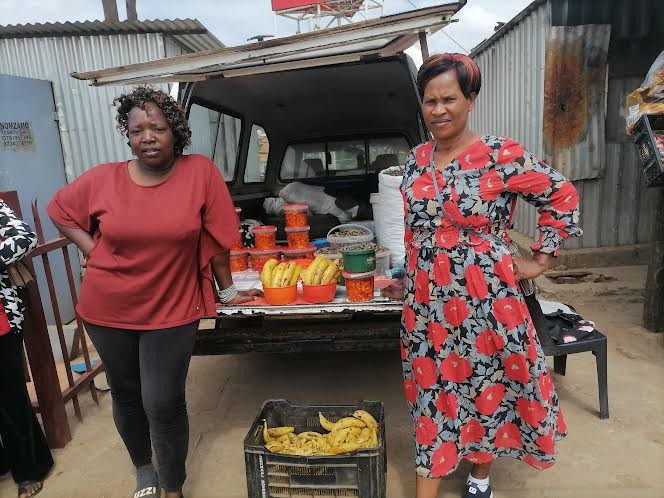
18 October 2023
Julia Madavha (left), leader of a group of hawkers who had to move from the D4 road in Elim, stands with Eunice Mhaka, who sells bananas and mopane worms. Photos: Bernard Chiguvare
Dozens of hawkers, who have been selling food and other products along the D4 road near Elim in Limpopo, say they were given two days to dismantle their stalls so that road repairs could start.
The hawkers say they should have been given more notice and should have been allocated temporary spaces.
The R20-million road repair of the D4, which connects Elim township to the N1, started in July and is expected to be completed by December, according to the Limpopo Department of Public Works.
Julia Madavha, leader of the hawkers, said most of them have been trading along the road for more than ten years.
When GroundUp visited the site on Saturday, 14 October, some of the hawkers were trying to set up stalls along the Elim-Louis Trichardt road. Others had decided to stop trading while they looked for new sites. Some sell perishables and they were worried that their stock will expire.
Madavha said the hawkers pay R500 a year to the traditional council and R285 to the municipality for a licence to trade.
John Ntabeni, from the Njhakanjhaka traditional council, confirmed the fee. He said he had advised the hawkers to find alternative sites. Asked whether the hawkers would be helped to find new sites, he said the tribal authority was “looking into the matter”.
GroundUp also saw a copy of the “street vendor license” and a renewal receipt from September 2023 issued to one of the hawkers. The fee has gone up from R259.30 last year to R285 this year.
However, spokesperson for the Makhado municipality, Louis Bobodi, said the hawkers did not pay fees according to his information, and he asked us to send him copies.
Some of the stalls along the D4 have already been demolished.
Eunice Mhaka, who sells bananas, mopane worms and atchar from the back of her Toyota bakkie, said she has moved with Madavha to another road, the R578 to Louis Trichardt.
“I am a widow and this is my only means of providing food for my family. I have been running the stall for more than a decade and this has been my source of money for educating my children. Now I am really stranded since most of my customers are not aware of my temporary place,” said Mhaka.
She said on a busy day she used to make R1,000, but at her new place she barely makes R200 a day.
“We beg for the rehabilitation of the road to be done speedily so that we can go back to our usual places,” she said.
Sarah Mukwebo, who is 80 and sells snuff and steel pots, has also moved to a new location.
“I have educated my children from this business,” she said. “Now, my dream of educating my grandchildren may not be fulfilled. Today, I just came to check if I can squeeze in at this corner, but it is already 9am and I have not had any sales.”
“Instructing the hawkers to demolish the stalls without giving them enough time is not justified,” said Elim resident Vicky Muvhali.
Witness Tiva, spokesperson for the MEC of the Limpopo Department of Public Works, Roads and Infrastructure, said that after a meeting at Njhakanjhaka Tribal Authority, hawkers had been informed that when the contractor reached their stalls, they would have to move temporarily.
Madavha confirmed this meeting took place in March.
Tiva said, “When the contractor approached the four way stop, a meeting was held with the hawkers informing them that the contractor was approaching the area. The hawkers agreed to two days’ notice.”
But Madavha said there was no second meeting, and she said, “It is not true that we agreed to the two days’ notice. We had no option but to dismantle the stalls.”
Eighty-year-old Sarah Mukwebo says she is not getting any business at her new location.